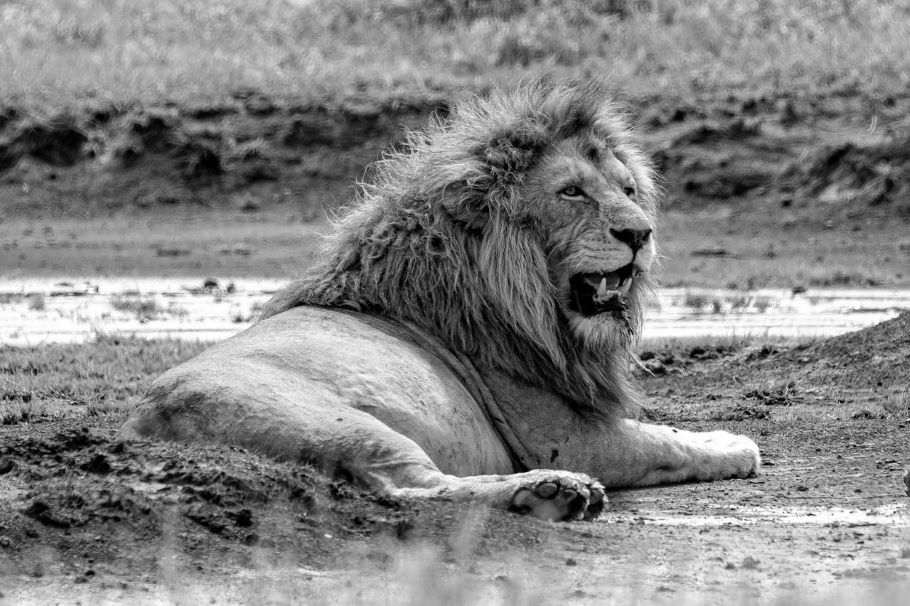Big Five African game animals have roamed through Africa for hundreds of thousands of years, but the actual “Big 5” was only determined in the 1800s by British colonists. The term “Big 5” was created to portray the five most difficult and dangerous African game hunting animals. Initially, these animals included the lion, leopard, Cape buffalo, elephant, and black rhino. Many hunters are unaware that a white rhino was not originally part of the actual Big 5, but the black rhino is much more dangerous and aggressive than his square-lipped relative, and that booked his spot in the group.
Today, either black or white rhinos are considered part of the Big 5 for several reasons:
- Restriction of black rhino hunting in many countries,
- The imminent threat of population extinction to both species,
- The recent population decrease as a result of poaching.
However, due to controlled and responsible hunting, the black rhino can be a safari hunting target in many African countries.
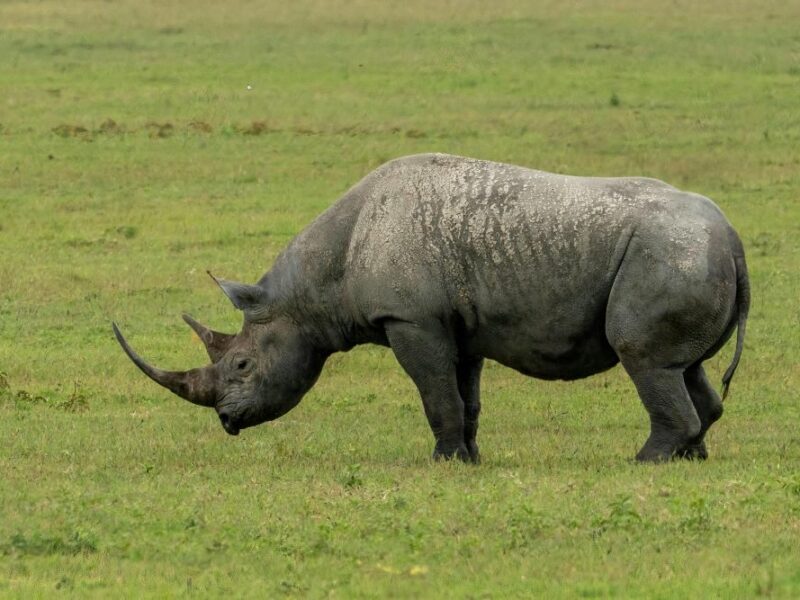
[DYNAMIC-BLOGTABLEOFCONTENT]
Big Game Hunting: What Is The “Top 5 Hunting in Africa?”
Top 5 hunting is another term referring to the Big 5. It is a term developed by a group of American hunters and is, in certain ways, more applicable than “Big 5.” When one hears “big,” they think of physical stature and size, which is not the case as there are many antelope that are bigger than a leopard, for example. This makes the term “Top 5” more descriptive as it describes the top and most costly hunts, with a fatal mistake even costing one’s life. The African big 5 hunt cost will be significant, this is why many hunters choose to hunt a certain species or a few species of the Big 5 on one safari, and not all simultaneously. There are also ideal destinations to hunt certain species, and as with rhino hunting, many countries don’t allow this.
Another flaw in the term “Big 5” is that it refers to hunting the most dangerous animals. In Africa, hippos are responsible for the most human deaths. This is a direct result of their aggressive behavior and is typically young children and tribeswomen who are bathing or washing clothes in the nearby river. This occurs when people and wildlife share a home, and animal-human conflict is a serious problem throughout Africa. Crocodiles also take many human lives on an annual basis and are not considered to be a part of the Big 5. But the term was created, and now it is used throughout the safari hunting and photographic safari industry.

African Big 5 Hunt Costs
African Big 5 Hunt Cost: The African Lion
Lions in terms of African big game are a fierce and powerful obstacle to dominate. The name “King of the Jungle” wasn’t given to this majestic specimen because it is a submissive little cat! Rather, it is an apex predator that specializes in killing, it dominates all other African cats and will prey on any species of African game, including elephants, rhinos, hippos, and giraffes. Do not underestimate this beast, for it will be your ultimate demise.
However, big game hunting specialists refer to the lion as one of the easier animals to hunt when compared to other big five African game animals. A lion has a very thin skin when compared to other members of the Big 5. Typical shot placement on a lion is the same as any other plains game essentially, with slight variations according to body position. This, with smaller size and stature, results in a more lenient margin of error when taking the shot.
There are many excellent locations to hunt lions throughout Africa, but the best is arguably in the Kalahari Desert, South Africa. These lions possess genetics that many believe to be inherited from the Cape lion, a now-extinct species of lion originally occurring in Southern Africa but was significantly larger than today’s typical lion. Naturally occurring in the Kalahari Desert, these lions are not as big as their cousin, the Cape lion. However, there is a significant size difference when compared with other lions occurring throughout Africa. In many cases, hunters who successfully hunt a lion in the Kalahari later find out that their taxidermist had to use a tiger mount to fit the head and cape of their Kalahari lion.
The African Big 5 hunt cost for an African lion, when compared with other members of the Big 5, is quite affordable. Prices start at roughly US$10,000, reaching prices that exceed US$100,000 in countries such as Tanzania. The cost of a lioness is pretty standard, varying according to each outfitter’s discretion. However, the pricing of male lions is precise. Fully mature lions are graded according to the size and color of their mane, with a dark black mane that extends down the stomach having the most significant price tag.
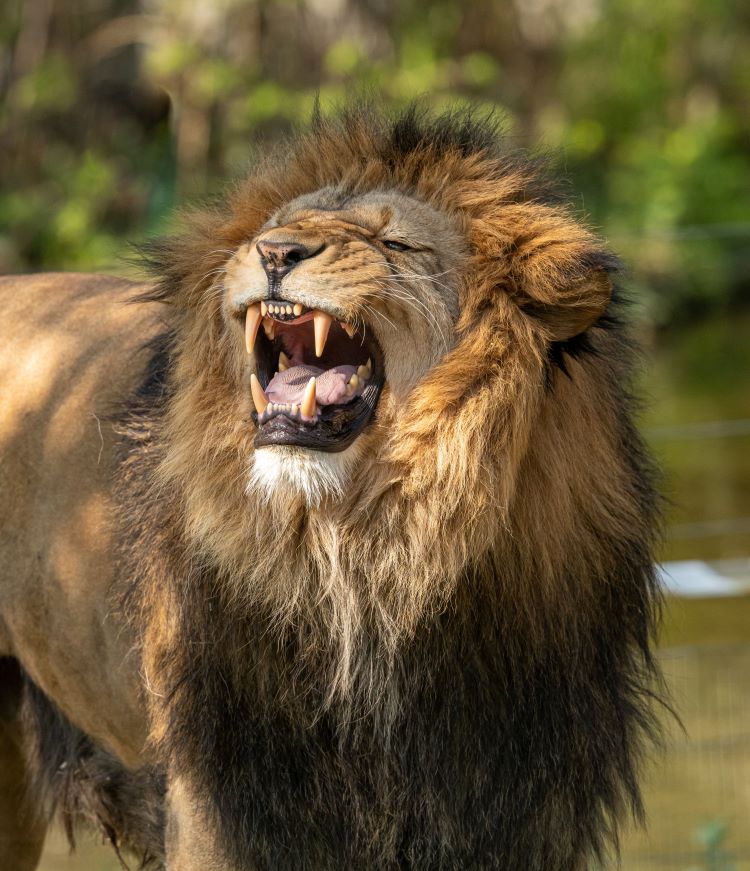
African Big 5 Hunt Cost: The Leopard
The leopard is probably the most beautiful of the Big Five African game animals, and, once again, exceptionally dangerous. This animal is typically non-confrontational and will flee rather than attack in most situations. However, to find yourself looking for a wounded leopard in the night during a big game hunting safari may be the most realistic near-death experience there is!
Leopards are mostly hunted using bait, as the animal is too clever and alert to stalk. A bait is placed according to where the Professional Hunter (PH) has seen signs of a leopard or where they think the leopard may occur. Bait is then regularly placed in this tree once the leopard starts feeding. The PH then needs to try to determine the behavior of the leopard and create a situation where his client may successfully hunt it.
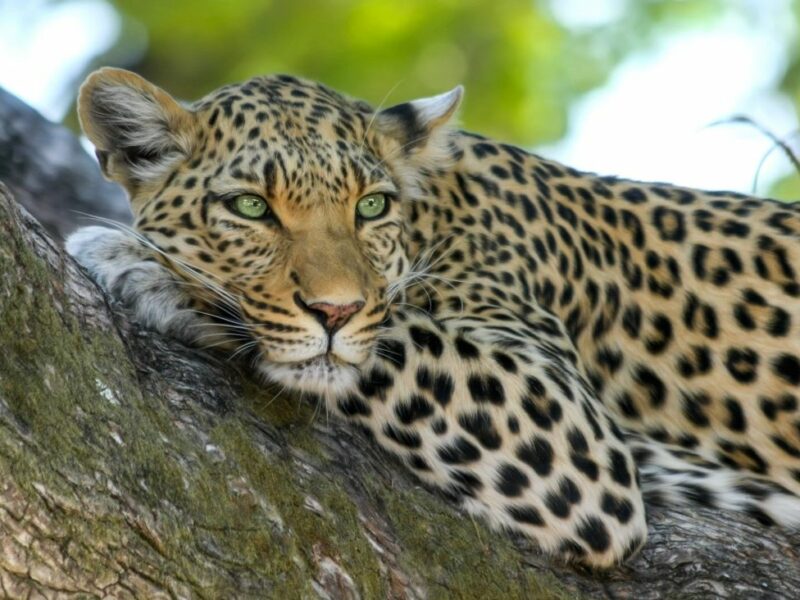
A leopard hunt is undeniably the hunt that requires the most preparation prior to the actual hunt commencing. However, if the PH can create the situation for a perfect leopard hunt, then one must understand they are dealing with an expert in their field. Leopards are exceptionally shy and skittish animals. In one second, a leopard can go from feeding at a bait tree for three weeks to never returning to that tree ever again because he feels threatened.
The cost of an African Big 5 hunt targeting a leopard ranges between US$18,000-40,000.
African Big 5 Hunt Cost: The Cape Buffalo
The Cape buffalo is an iconic African big game animal, they are large and powerful creatures generally with bad attitudes and will not hesitate to confront their opposition. They earned their nickname “Black Death” as they are colored in a dark blackish-brown and have killed more people in a hunting situation than any of the other Big Five African game animals.
Cape buffalo are renowned for charging when wounded or even in a situation where they feel threatened. They are generally hunted throughout Africa using the spot and stalk method. On a Cape buffalo game hunting safari, you can expect to walk quite a distance daily, looking at many different bulls and checking signs and tracks in the environment to determine the location and behavior of the herd or individual buffalo.
Shot placement on the initial shot is fairly standard as with all other plains game, one-third of the way up on the shoulder when standing broadside. This is the safest and most reliable body position to shoot a Cape buffalo. The typical cost to hunt a Cape buffalo ranges according to the animal’s area, bloodline, and horn width. A hunter generally looks at a Cape buffalo in the price range between US$8,000-15,000. However, prices may increase to well above US$50,000 for a massive, unique trophy Cape buffalo bull.
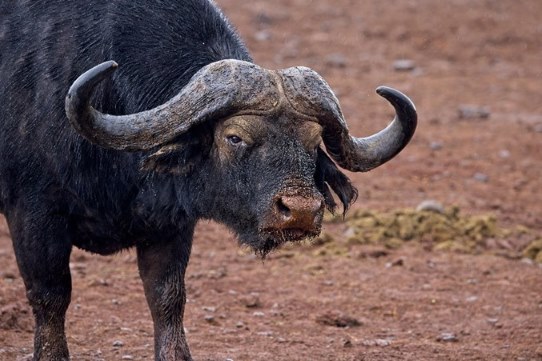
African Big 5 Hunt Cost: The Elephant
Elephant safari hunting will require the most effort and practice in preparation for the hunt. As a rule of thumb, many PHs generalize that for every pound of elephant ivory, the hunter will walk at least one mile. This means that if a hunter wants to target a big elephant bull successfully on a game hunting safari, they will walk a significant distance throughout the hunt. Training and preparation by the hunter is vital from this point of view, and the hunter must train months in advance to ensure they are fit and healthy enough to walk considerable distances each day.
The shot placement on an elephant is usually directly into the brain to ensure an immediate death. This is completed to ensure the animal does not escape or attack the game hunting party. Shooting training, practice, and preparation are just as vital to ensure that the hunter is capable of making that perfect shot. The perfect shot is directly into the brain and is easily identified as the brain sits directly behind the earhole when standing broadside. When in a frontal position, the hunter should aim directly in the middle of the head below the eyes; this will ensure a quick and efficient brain shot, killing the elephant instantly.
As for African big game pricing, the elephant will generally require the most expensive payment. The price for an average mature elephant bull will range between US$25,000-50,000. For exceptional trophies, it is not uncommon that an elephant big game hunting safari will cost roughly US$100,000.
African Big 5 Hunt Cost: The Rhino
When comparing all African big game, the rhino is the scarcest to hunt. This is because successfully obtaining the necessary rhino hunting permit in most countries is rather challenging, especially for black rhino hunting. The actual hunt is generally not typically challenging. Usually, a specific rhino is targeted, one that is old and past its breeding years. These types of animals do not serve any purpose as they are done breeding, and typically, old bulls will dominate an area where they restrict younger fertile bulls from breeding with cows. The only option is to remove these older males from the system, and the most effective and successful fundraising method is through game hunting.
As for all trophy game hunting, old bulls are targeted. This means that the system that controls the responsible hunting of all rhinos is undeniably effective in both raising necessary conservation funds and managing the species’ population, which directly promotes population growth that is essential for bringing all rhinos back from near extinction.
Big game hunting a rhino will cost anywhere between $20, 000 and $100, 000, depending on the area and species of the rhino.
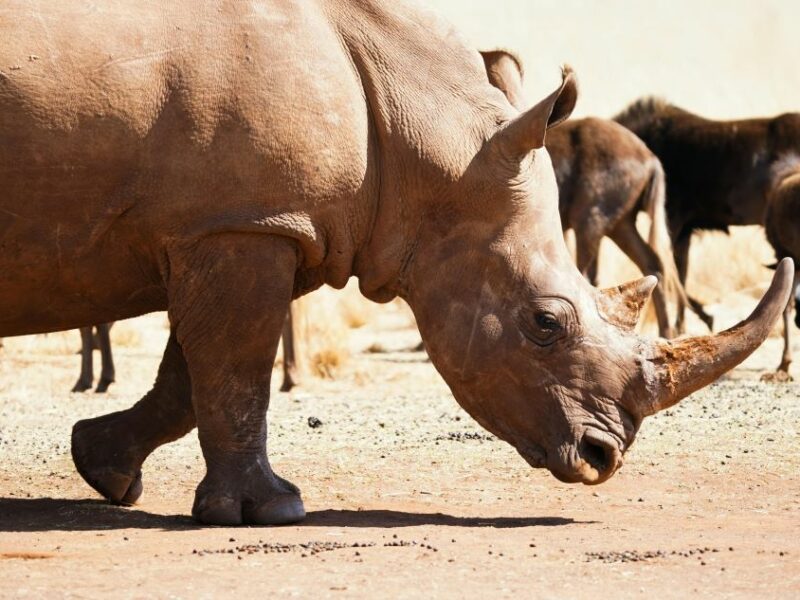
Which African Big 5 Animal Costs The Most To Hunt?
- Big five African game animals are the most sought-after trophies according to statistics based on recent conservation-based research.
- Out of the group, the elephant is generally the costliest animal to successfully hunt. In terms of big game hunting it requires the most time spent in the field and the most accurate shot placement.
- These factors, along with the ecological value of the animal, result in the most expensive hunt to complete in Africa.
- This excludes the taxidermy costs of mounting and preserving the trophy.
What are the Trophy Fees in South Africa?
- Trophy fees are generally a portion of the price, which is due to the government, as the wildlife in concessions and hunting areas is considered to be the property of the government.
- This is generally in countries such as Namibia, Mozambique, Zimbabwe, Tanzania, and Zambia, essentially any hunting area or concession that the government owns.
- This is not always the case in South Africa. Yes, there are many government concessions in South Africa in which they ask for a trophy fee.
- However, South Africa is home to a large wildlife industry, that comprises privately owned businesses and game ranches.
- These private hunting areas, more often than not, produce exceptional trophies, which cannot always be obtained in open-system concessions.
- In this case, the trophy fee is not due to the government but to the private company or game ranch. The trophy fee is generally different from the government’s and will be determined between the land owner and the hunting outfitter.
- The trophy fee will be presented on the marketing material; if not, it is generally included in the package.
Which Country is Best for an African Big Game Hunting Safari?
For an all-round big game hunting experience, South Africa proves to be one of the best destinations. There are various other African countries, such as Tanzania, Zimbabwe, and Zambia offering amazing game hunting safaris and hunting adventures. However, South Africa has a well-known reputation for producing African big game which is genetically superior when compared to other hunting destinations. The hunting community and industry within South Africa are well established, as game hunting is, for many people, a way of life, a sufficient source of income, and a stable industry to work in.

If you enjoyed this article, read more about Big 5 Hunting in Africa and Animal Add-ons when Big 5 Hunting in Africa.
Author: K.C. van Wyk
Conservationist & Professional Hunter
